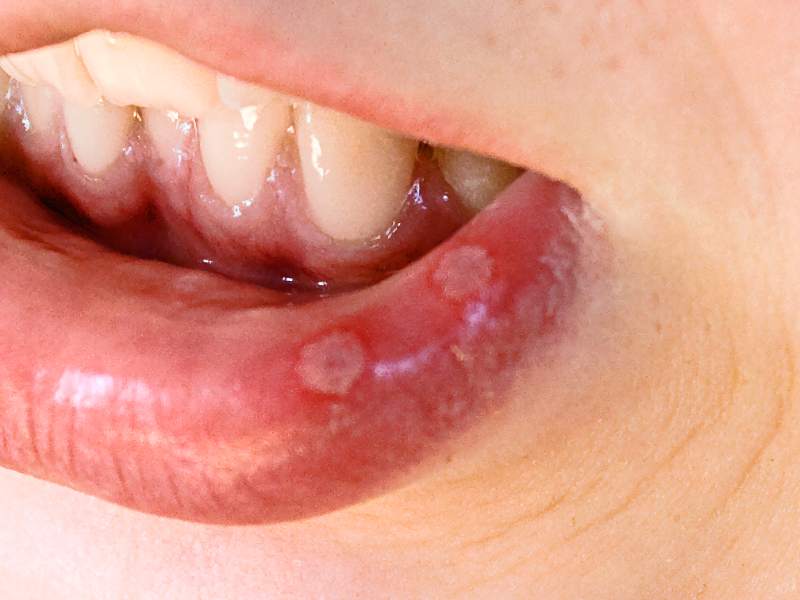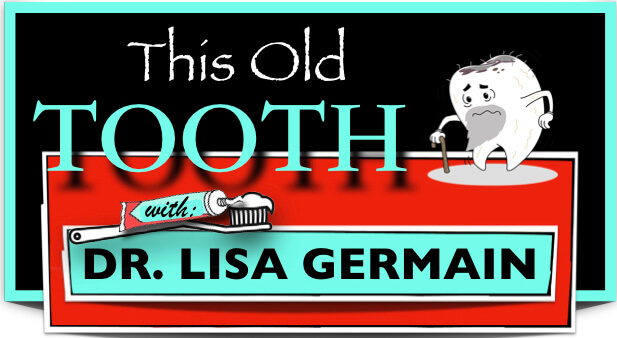Are Mouth Ulcers and Cold Sores Contagious?

Are cold sores and mouth ulcers contagious?
To start with, contagious means capable of being transmitted by bodily contact with an infected person or object. I can tell you that it all depends on what the actual cause is of the sore on or in your mouth because an ulcer and a cold sore have two completely different causes. Mouth ulcers, also called aphthous ulcers or canker sores, are painful areas in the mouth and gums.
Three Main Types of Mouth Ulcers
While mostly harmless, they can be extremely uncomfortable and make it difficult for some people to eat, drink, and brush their teeth. Now here’s an important distinction. An ulcer is caused by an irritation and a cold sore is caused by a virus. An ulcer is not contagious, but a cold sore is. But differentiating them can be extremely confusing and they often look alike. There are three main types of mouth ulcers and I’m just talking about the ulcers now, not the cold sores.
1. Type one – Minor Ulcer
Type one is a minor ulcer that will range in size from about two millimeters up to about eight millimeters across. Now, these also typically take up to two weeks to get better and will cause just really minor pain.
2. Type Two – Major Ulcer
Then there’s type two and this would be a major ulcer, obviously bigger than minor ulcers and they are often irregular in shape. They may be raised and they definitely penetrate deeper into the tissue than minor ulcers. They can take several weeks to go away and are likely to leave scar tissue when they clear up.
3. Type Three – Herpetiform in Nature
But things start to get very confusing when we start talking about the third type of ulcer, which is herpetiform in nature. Herpetiform ulcers are a subtype of aphthous ulcers and canker sores. They get their name because they resemble cold sores. However, unlike cold sores, they are not contagious. This third type of ulcer comes back very quickly and it may appear that the condition never gets better because the person that has them is constantly plagued with new ones reappearing. Now they can increase in size, eventually coming together to form a large ragged ulcer. They can appear anywhere in the mouth. They tend to be found in more females than males and we are not really quite sure why and are more common in older adults. Patients who suffer from frequent bouts of ulcers can also experience fever, sluggishness and swollen glands, and while we don’t know what actually causes them and why some people get them and others don’t, this is what we observe. Stress and anxiety seem to trigger them. Citrus fruits and other highly acidic foods and beverages, as well as spices, seem to increase the incidence of them in patients who are susceptible. Now, any kind of trauma might be the cause. For example, biting your tongue or cheek, ill-fitting dentures, rough or broken fillings, and braces. I have a patient who gets horrible ulcers after any type of dental work including having their teeth cleaned. There’s also evidence that hormonal changes during pregnancy, puberty, menopause, or monthly menses can trigger an attack.
Mouth Ulcers Causes
Now, some cases of complex canker sores are caused by an underlying health condition such as an impaired immune system, nutritional problems such as vitamin B12, zinc, folic acid, or iron deficiency or gastrointestinal tract diseases such as celiac disease, acid reflux, or GERD and Crohn’s disease.
Mouth Ulcers Treatments
Although there is no cure for canker sores and they often recur, you may be able to reduce their frequency by avoiding foods that irritate your mouth, including citrus fruits, acidic vegetables, and spicy foods, reducing your stress level and by brushing with a soft-bristled brush after meals and flossing daily, which will keep your mouth free of foods that might trigger a sore. In many cases, the pain and discomfort will lessen in a few days and then disappear in about two weeks by themselves without any kind of treatment.
But for people with much more painful or frequent recurrence of mouth ulcers, a dentist may prescribe a solution to reduce swelling and lessen the pain. Also, you may get a prescription from your dentist for an antimicrobial alcohol-free mouthwash or an ointment to be applied directly to the infected patch. This can help to ease the discomfort. Now, various mouth ulcer treatments are also available over the counter at your local pharmacy. Canker sores can also be treated with dental lasers. Sometimes this can result in complete relief of the symptoms immediately, so talk to your dentist about this procedure.
Unlike Canker Sores, Cold Sores Are Extremely Contagious
Unlike canker sores and aphthous ulcers, cold sores are extremely contagious despite the name. When you get painful blisters called cold sores, don’t blame your cold.
Cold Sores Facts
- Cold sores are caused by a virus, but not the kind that makes you sniffle and sneeze. Instead, they happen because of an infection with the herpes simplex virus.
- Cold sores, also called fever blisters, can show up anywhere on your body.
- They’re most likely to appear on the outside of your mouth and lips, but you can also find them on your nose, cheeks or fingers.
- The sores usually last 7 to 10 days and they are highly contagious.
- Did I mention that they are highly contagious? It may surprise you to hear that just about 90% of all people get at least one cold sore in their life.
Symptoms of Cold Sores
- The symptoms are usually the most severe the first time you get a cold sore . After the first time you get one, your body may develop antibodies and you’ll never have another infection. But unfortunately, about 40% of those plagued with cold sores, get them repeatedly now on their own.
- Cold sores generally are not that serious, but the infection may be life- threatening for anyone who has AIDS or other diseases that would compromise the immune system.
- If you have a severe case of a skin condition called eczema, you may get cold sores over a large part of your body.
- There can sometimes be serious complications from a cold sore if the infection spreads to your eye because it could affect your vision. If it spreads to the brain, it could lead to meningitis or encephalitis.
Sometimes when kids are affected, they may become seriously ill. This is nothing to play around with and you definitely want to make sure that you involve your family physician if you are prone to getting cold sores. A cold sore may erupt as late as 20 days after you come into contact with the virus. Once the virus enters your body, the cold sore may appear near the part it entered. They usually pass through several stages. The first one is perhaps tingling and itching. Many people feel this or even a burning sensation around their lips for a day or so before a small hard, painful spot appears and then the blisters erupt. The blisters are the second stage. These small fluid-filled blisters typically break out all along the border where the outer edge of the lips meets the skin of the face. Cold sores can also occur around the nose or on the cheeks.
It is a fact that the blister is filled with fluid that differentiates it from the appearance of an aphthous ulcer or a canker sore. The third stage is oozing and crusting. The small blisters may merge and then burst leaving shallow open sores. They will ooze fluid and then crust over. Once the fluid has gone, the good news is they are no longer considered contagious. However, it is better to be safe than sorry. Signs and symptoms vary depending on whether this is your first outbreak or a recurrence. They can last for several days and the blisters can take two to four weeks to heal completely. Recurrences typically appear at the same spot each time and tend to be less severe than the first outbreak. Some things can trigger them such as certain foods, stress, fever, colds, hence the name cold sore, allergies, sunburns, and anything hormonal.
To protect other people when you have cold sores, don’t kiss anyone. Don’t share forks, knives, spoons, glasses, towels, lip balm or razors. Remember that any close contact with the infected area can be transmitted to another person. Many patients who are plagued with cold sores feel that tingling in the beginning and they know to start taking an antiviral medication such as Acyclovir, which is something that your physician can prescribe for you. While it is not a cure, this medication will make the blisters go away much quicker. People who frequently get mouth ulcers and cold sores may find it difficult to know when to see a doctor. There are some situations, however, where a person should see a doctor as soon as possible. Some of these circumstances include the appearance of a non-painful ulcer in one or more areas of your mouth or unusual ulcers that appear in a new spot in the mouth, ulcers that are spreading, ulcers that lasts longer than three weeks and anything that is particularly painful or big. If a fever develops, you may be coming down with a secondary infection and you definitely want to see your physician. It is important to let your physician know also if they develop after starting a new medication.
The Good News!
The good news is that neither mouth ulcers nor cold sores are cancer. There are some fundamental differences between mouth ulcers and what might be cancer. Oral cancer usually presents as a non-painful problem, whereas mouth ulcers and herpetic cold sores are usually painful. Whereas a mouth ulcer will clear up in about two weeks, mouth cancer will not go away and will often spread. Mouth cancer patches may be rough and hard and not easy to scrape off. They’re often a mix of red and white areas or large white areas that appear on the tongue, the back of the mouth, the gums and in the cheeks. However, as I mentioned earlier, new or persistent ulcers need to be checked by your physician.

